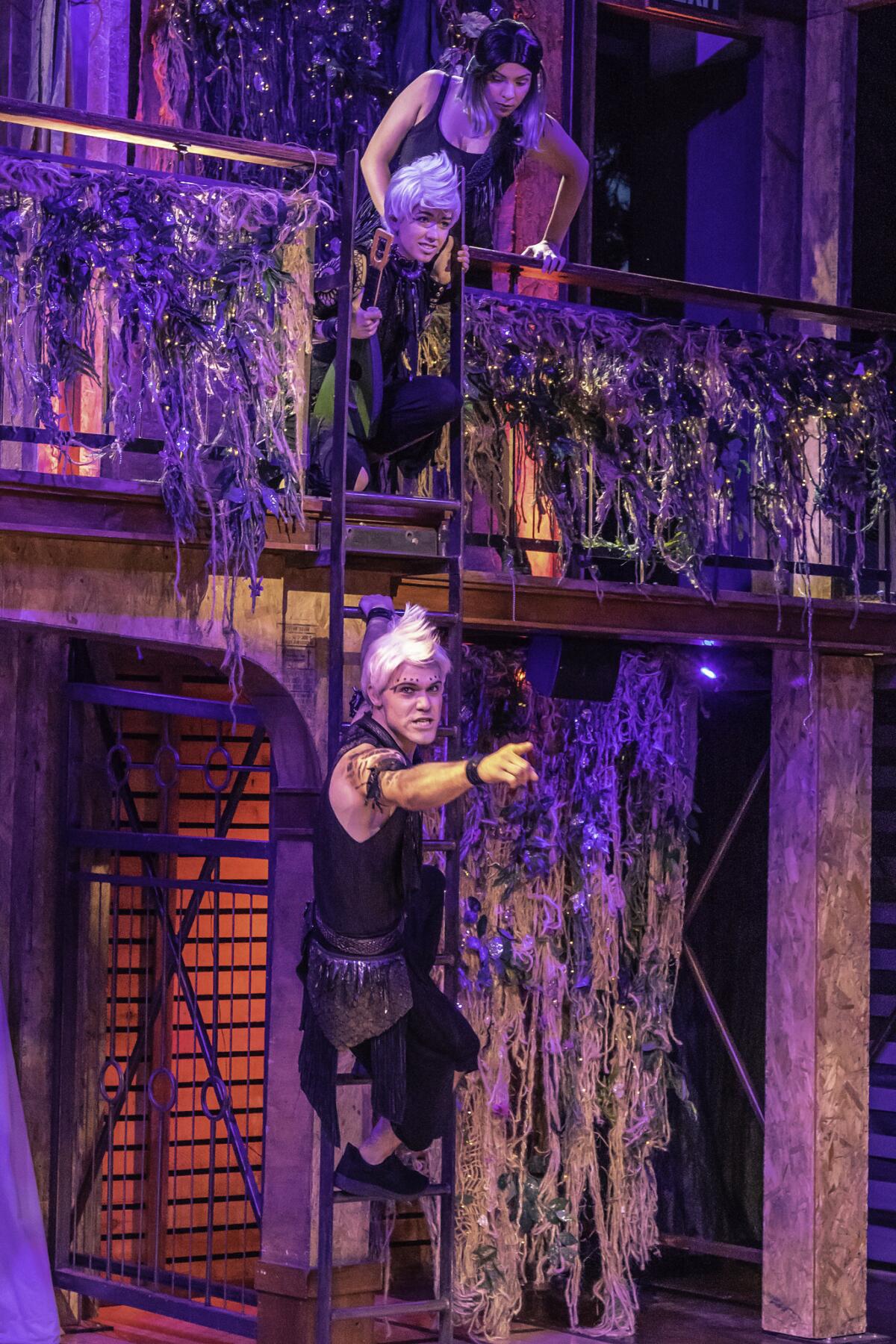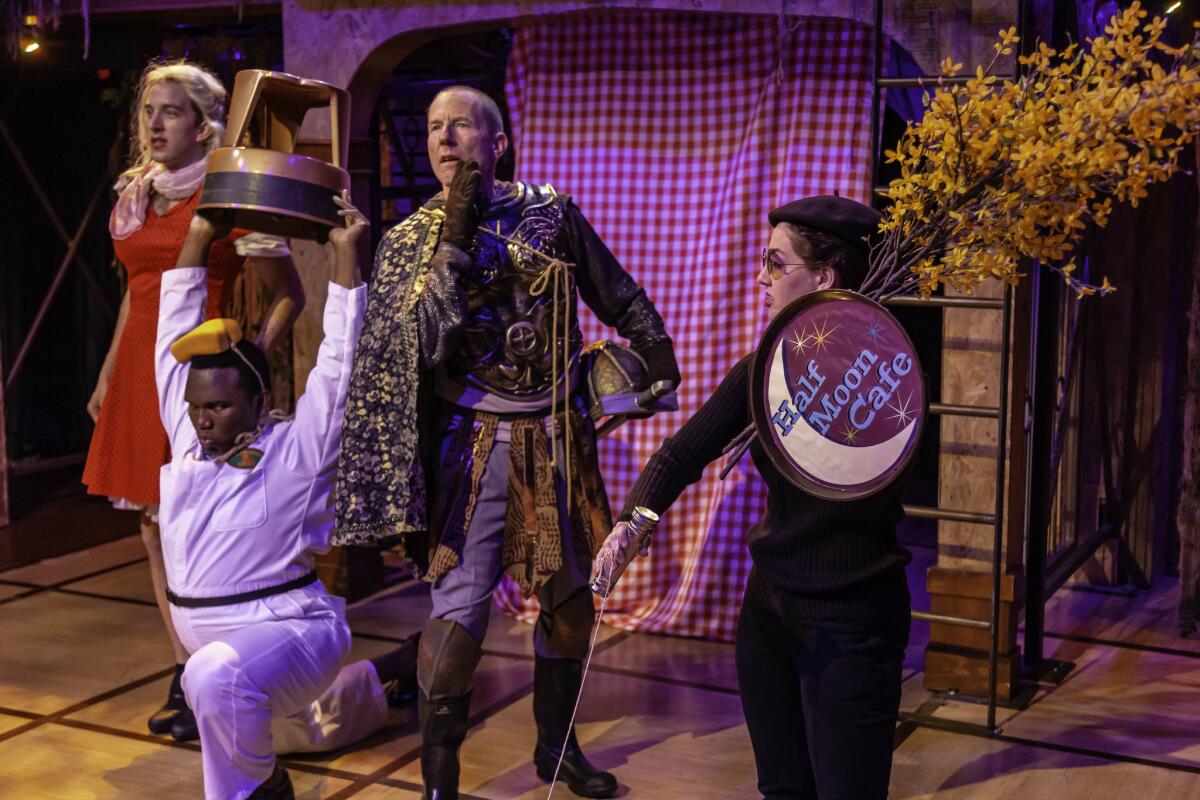Review: ‘Midsummer Night’s Dream’ with a lesbian twist at New Swan Shakespeare in Irvine
Gender fluidity is as natural in Shakespeare’s plays as blank verse. Boy actors originally played the female roles, and cross-dressing was a staple of his comic plots.
“As You Like It” wouldn’t be how we like it without Rosalind mannishly donning doublet and hose. So it’s no surprise that the gender bending imposed on the New Swan Shakespeare Festival production of “A Midsummer Night’s Dream” is pulled off with aplomb.
Lysander, one of the four young Athenian lovers, has been transformed into Lysandra (Kayla Kearney). This arrangement adds a lesbian twist to the quartet’s antics in the supernatural woods outside of Athens one bewitching summer night.
In traditional productions it can be difficult to keep these rollicking romantics straight, so to speak. The play is patterned more like a dance than a character-based romantic comedy.
The swooning figures in this inclusive staging are impossible to confuse. Even after an herbal drug unleashes a dizzying quantity of amorous mischief, a prank administered by Puck (an athletic Thomas Varga), there’s no mistaking who’s zooming who.

Crystal Kim’s Hermia, beloved by Demetrius (a captivatingly frolicsome Tristan Turner), is fiercely determined to marry Lysandra despite her father’s objections, which here take on a homophobic taint. Bookishly gawky Helena (Maya Smoot), demented for Demetrius, refuses to let her insecurities — or dignity— stand in the way of her heart’s desire.
Eli Simon, the artistic director of the New Swan Shakespeare Festival, held outdoors in a charmingly makeshift Elizabethan theater on the UC Irvine campus, stages their sylvan shenanigans with festive fluidity. The high spirits are infectious, at least until the second half when the silliness is allowed to devolve into mere horseplay.
Updating the period to the doo-wop 1950s oversaturates the comic milieu. The production works best when it operates outside of time, in a make-believe space that blurs the line between imagination and reality.
Oberon, King of the Fairies, resembles a Sha Na Na benchwarmer. Varga’s Puck sports a spikey mullet and jams with Oberon, his lord and master, on guitar.
Why Quince (Patsy Quince here, played by Amy Tilson-Lumetta), the carpenter-cum-playwright organizing the band of artisans known as the rude mechanicals, is dressed as a diner waitress is anyone’s guess. Bottom (Greg Ungar), the star player in Quince’s ragtag ensemble, affects a Chico Marx-style Italian accent when the troupe performs for Theseus (Sean Spann), the Duke of Athens, and his bride, Hippolyta (Anica Garcia-DeGraff), after all the romantic chaos has been sorted out.
A simpler approach to the fun and games of “A Midsummer Night’s Dream,” one that doesn’t clutter the theatrical canvas and eclipse the poetry, is a more reliable strategy for a production that casts students alongside professionals. Kim’s Hermia, Kearney’s Lysandra, Turner’s Demetrius and Smoot’s Helena, all of whom are in UC Irvine’s MFA acting program, are at their vivid best when finding the humor that’s already resident in the plot and dialogue.
Spann and Garcia-DeGraff’s straightforward approach to the royal couple, whose nuptials occasion the festive atmosphere, is palate-cleansing. But despite moments of forced frenzy, there’s something agreeable about watching this eager-to-please “Midsummer” under a moonlit sky in a staging that outstretches a wide communal embrace.

♦ ♦ ♦ ♦ ♦ ♦ ♦ ♦ ♦ ♦
‘A Midsummer Night’s Dream’
Where: New Swan Theater, Gateway Common, UC Irvine
When: 8 p.m. Wednesdays-Sundays; ends Sept. 1 (alternating with “The Winter’s Tale”)
Tickets: $15-$60
Info: (949) 824-2787, www.newswanshakespeare.com
Running time: 2 hours, 20 minutes
Follow me @charlesmcnulty
The biggest entertainment stories
Get our big stories about Hollywood, film, television, music, arts, culture and more right in your inbox as soon as they publish.
You may occasionally receive promotional content from the Los Angeles Times.




